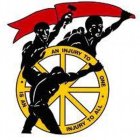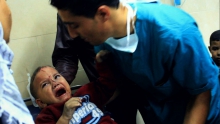
We will not “return to a living death” of siege and blockade, say Gaza civil society leaders.
(Ashraf Amra / APA images)
(Ashraf Amra / APA images)
Our foremost concerns are not only the health and safety of the people in our communities, but also the quality of their lives – their ability to live free of fear of imprisonment without due process, to support their families through gainful employment, and to travel to visit their relatives and further their education.
These are fundamental human aspirations that have been severely limited for the Palestinian people for more than 47 years, but that have been particularly deprived from residents of Gaza since 2007. We have been pushed beyond the limits of what a normal person can be expected to endure.
A living death
Charges in the media and by politicians of various stripes that accuse Hamas of ordering Gaza residents to resist evacuation orders, and thus use them as human shields, are untrue. With temporary shelters full and the indiscriminate Israeli shelling, there is literally no place that is safe in Gaza.Likewise, Hamas represented the sentiment of the vast majority of residents when it rejected the unilateral ceasefire proposed by Egypt and Israel without consulting anyone in Gaza. We share the broadly held public sentiment that it is unacceptable to merely return to the status quo – in which Israel strictly limits travel in and out of the Gaza Strip, controls the supplies that come in (including a ban on most construction materials), and prohibits virtually all exports, thus crippling the economy and triggering one of the highest poverty and unemployment rates in the Arab world.
To do so would mean a return to a living death.
Unfortunately, past experience has shown that the Israeli government repeatedly reneges on promises for further negotiations, as well as on its commitments to reform.
Likewise, the international community has demonstrated no political will to enforce these pledges. Therefore, we call for a ceasefire only when negotiated conditions result in the following:
- Freedom of movement of Palestinians in and out of the Gaza Strip.
- Unlimited import and export of supplies and goods, including by land, sea and air.
- Unrestricted use of the Gaza seaport.
- Monitoring and enforcement of these agreements by a body appointed by the United Nations, with appropriate security measures.
Signatures:
- Akram Habeeb, Assistant Professor of American Literature, Islamic University of Gaza (IUG)
- Mona El-Farra, Vice President and Health Chair of the Palestinian Red Crescent Society
- Ramy Abdu PhD, Chairman of the Euro-mid Observer
- Abdullah Alsaafin, Palestinian Writer/journalist
- Ali Alnazli, Businessman
- Adel Awadallah, Head of the Scientific Research Council
- Hanine Hassan, Graduate Research Assistant
- Sheren Awad, Journalist
- Yahia Al-Sarraj, Associate Professor of Transportation, IUG
- Tawfik Abu Shomar, Writer and political analyst
- Hasan Owda, Businessman
- Ibrahim AlYazji, Businessman
- Walid Al Husari, Chair, Gaza Chamber of Commerce
- Nael Almasri, Dentist
- Wael El-Mabhouh, Political researcher
- Rami Jundi, Political researcher
- Ashraf Mashharawi, Filmmaker
- Mohammad Alsawaf, Journalist
- Hasan Abdo, Writer and political analyst
- Kamal El Shaer, Political researcher
- Omar Ferwana, Dean of Medicine Faculty, IUG
- Iyad I. Al-Qarra, Journalist, Palestine newspaper
- Musheir El-Farra, Palestinian activist and author
- Khalil Namrouti, Associate Professor in Economics, IUG
- Moein Rajab, Professor in Economics, Al-Azhar University - Gaza
- Basil Nasser, Planning advisor
- Hani Albasoos, Associate Professor in Political Science, IUG
- Arafat Hilles, Assistant Professor, Al-Quds Open University
- Imad Falouji, Head of Adam Center for Dialogue of Civilizations
- Moin Naim, Writer and political analyst
- Yousri Alghoul, Author
- Mohammad Jayyab, Editor of Gaza Journal of Economics
- Mousa Lubbad, Lecturer in Finance, Al-Aqsa University
- Iskandar Nashwan, Assistant Professor in Accounting, Al-Aqsa University
- Shadi AlBarqouni, Graduate Research Assistant
- Adnan Abu Amer, Head of Political Department, Al-Umma University
- Wael Al Sarraj, Assistant Professor in Computer Science, IUG
- Said Namrouti, Lecturer in Human Resource Management, IUG
- Khaled Al-Hallaq, Assistant Professor in Civil Engineering, IUG
- Asad Asad, Vice Chancellor for Administrative Affairs, IUG
- Hazem Alhusari, Lecturer in Finance, Al-Aqsa University
- Shadi AlBarqouni, Graduate Research Assistant
- Deya’a Kahlout, Journalist, Al-Araby newspaper
- Raed Salha, Assistant Professor in Geography, IUG
- Sameeh Alhadad, Businessman
- Tarek M. Eslim, CEO, Altariq Systems and Projects
- Sami Almalfouh PhD, Senior engineer
- Fayed Abushammalah, Journalist
- Fadel Naeim, Chairman of Palestine Physicians Syndicate
- Zeyad Al-Sahhar, Associate Professor in Physics , Al-Aqsa University
- Iyad Abu Hjayer, Director, Palestinian Center for Democracy and Conflict Resolution
- Wael Al-Daya, Associate Professor in Finance, IUG
- Younis Eljarou, Head of the Red Crescent Society for the Gaza Strip
- Donia ElAmal Ismail, Head of the Creative Women Association
- Zeinab Alghonemi, Head of Women for Legal Consulting Association
- Amjad AlShawa, Palestinian Nongovernmental Organizations Network (PNGO)
- Mohsen Abo Ramadan, Head of Palestinian Nongovernmental Organziations Network (PNGO)
- Abed Alhameed Mortaja, Assistant Professor of Linguistics, IUG
- Talal Abo Shawesh , Head of Afaq Jadeeda Association
- Zohair Barzaq, Red Crescent Society for the Gaza Strip
- Marwan Alsabh, Red Crescent Society for the Gaza Strip
- Ghassan Matar, Red Crescent Society for the Gaza Strip
- Rania Lozon, Writer
- Ashraf Saqer, IT Specialist
- Samir AlMishal, Mishal Cultural Centre
- Jamila Sarhan, Independant Commission for Human Rights
- Jalal Arafat, Union of Agricultrual Work Committees
- Khalil Abu Shammala, Aldameer Association for Human Rights
- Jamila Dalloul, Association Head of Jothor ElZaiton
- Maha Abo Zour, Psychologist
- Psychologist Ferdous Alkatari
- Yousef Awadallah, Health Work Committee
- Yousef Alswaiti, Al-Awda Hospital Director
- Taysir Alsoltan, Head of Health Work Committees
- Taghreed Jomaa, Union of Palestinian Women’s Committees
- Imad Ifranji, Journalist, Alquds TV
- Jehal Alaklouk, Activist
- Adel Alborbar, Boycott Committee
- Hatem AbuShaban, Board of Trustees of Al-Azhar University - Gaza
- Saleh Zaqout, Secretary of the Red Crescent Society for the Gaza Strip
- Mohammed Alsaqqa, Lawyer
- Nihad Alsheikh Khalil, Professor of Modern and Contemporary History, IUG
- Mohsen Alafranji, Lecturer at Media Department, IUG
- Nedal Farid, Dean of Business Faculty, Al-Aqsa University
- Salem Helles, Dean of Commerce Faculty, IUG
- Ahmad Ali PhD, Economic Analysis
- Raed M. Zourob PhD, Head of the Department of Preventive Medicine, Ministry of Health
- Mosheer Amer, Professor of Lingusitics, IUG
- Moheeb Abu Alqumboz, Lecturer
- Fatma Mukhalalati, Supreme Court judge
- Fahmi Alnajjar, Supreme Court judge


 22 July 2014, via
22 July 2014, via 


